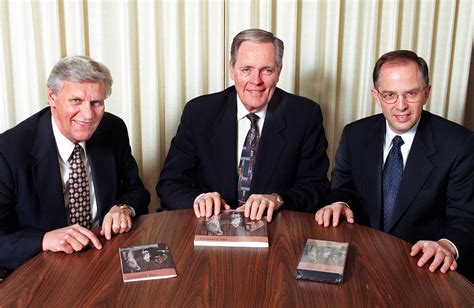A Quote by Patrick Henry
. . . Virtue, morality, and religion. This is the armor, my friend, and this alone that renders us invincible. These are the tactics we should study. If we lose these, we are conquered, fallen indeed . . . so long as our manners and principles remain sound, there is no danger.
Related Quotes
The founders of this nation understood that private morality is the fount from whence sound public policy springs. Replying to Washington's first inaugural address, the Senate stated: "We feel, sir, the force and acknowledge the justness of the observation that the foundation of our national policy should be lain in private morality. If individuals be not influenced by moral principles it is in vain to look for public virtue."
Anxieties about ourselves endure. If our proper study is indeed the study of humankind, then it has seemed-and still seems-to many that the study is dangerous. Perhaps we shall find out that we were not what we took ourselves to be. But if the historical development of science has indeed sometimes pricked our vanity, it has not plunged us into an abyss of immorality. Arguably, it has liberated us from misconceptions, and thereby aided us in our moral progress.
In his address of 19 September 1796, given as he prepared to leave office, President George Washington spoke about the importance of morality to the country's well-being: Of all the dispositions and habits which lead to political prosperity, Religion and Morality are indispensable supports. . . . And let us with caution indulge the supposition that morality can be maintained without religion. . . . Can it be that Providence has not connected the permanent felicity of a Nation with its virtue?
You have chosen to risk your lives for the defense of this country. I will not insult you by saying that you are dedicated to selfless service--it is not a virtue in my morality. In my morality, the defense of one's country means that a man is personally unwilling to live as the conquered slave of any enemy, foreign or domestic. This is an enormous virtue.
Whatever efforts one may make, one must revert to the realization that religion is the real basis of morality; religion is the real and perceptible purpose within us, which alone, can turn aside our attention from things. ... The science of morality can no more teach human beings to be honest, in all the magnificence of this word, than geometry can teach one how to draw.
Misanthropes have some admirable if paradoxical virtues. It is no exaggeration to say that we are among the nicest people you are likely to meet. Because good manners build sturdy walls, our distaste for intimacy makes us exceedingly cordial "ships that pass in the night." As long as you remain a stranger we will be your friend forever.
Of all the dispositions and habits which lead to political prosperity, religion and morality are indispensable supports. In vain would that man claim tribute to patriotism who should labor to subvert these great pillars of human happiness - these firmest props of the duties of men and citizens. . . . reason and experience both forbid us to expect that national morality can prevail in exclusion of religious principles.
Into each of our lives come golden moments of adversity. This painful friend breaks our hearts, drops us to our knees, and makes us realize we are nothing without our Lord and Savior. This friend makes us plead all the night long for reassurance and into the next day and sometimes for weeks and months. But, ultimately, just as surely as the day follows the night, as we remain true and faithful, this strange friend, adversity, leads us straight into the outstretched arms of the Savior.
































